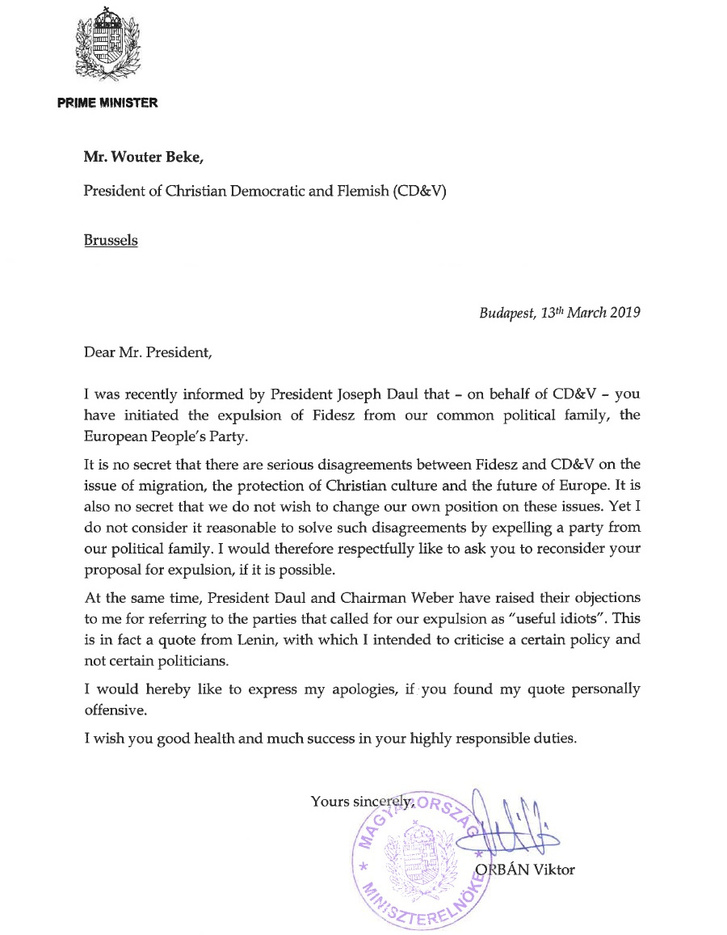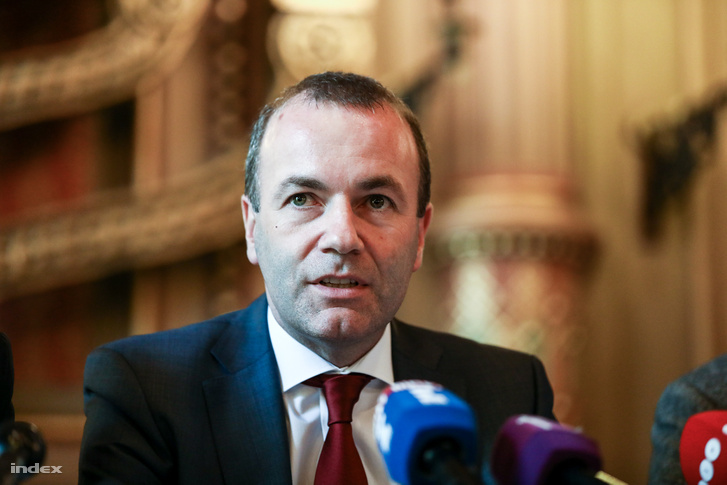Fidesz vs. EPP - Is Viktor Orbán giving in to Weber's demands?

Prime Minister Viktor Orbán has apologised to his opponents in the EPP for calling them "useful idiots", however, insisted on maintaining his current policies and political positions in his letter of apology. The offending posters are being phased out, and there is an offer on the table by Manfred Weber concerning CEU which the Hungarian government seems not to refuse. Could Viktor Orbán actually be submitting to Weber's ultimatum?
Hungarian Prime Minister's party Fidesz is currently facing expulsion from its European political group, the European People's Party. Twelve member parties of the EPP initiated the expulsion of the Hungarian member party citing the unacceptable political campaign of the Hungarian government that features billboards with EPP's Jean-Claude Juncker with George Soros grinning behind him next to the tagline "You have a right to know what Brussels is preparing for."
EPP's lead candidate Manfred Weber visited Viktor Orbán in Budapest on Tuesday and confirmed that the conflict with Fidesz stems from fundamental issues, and reinforced the three conditions set forth in his ultimatum issued earlier. Weber said that in order for Fidesz to remain in the EPP,
- The government has to stop its campaign against Brussels and the EU once and for all,
- Viktor Orbán has to apologise to the members of the EPP he has offended,
- and that he has to ensure that CEU's Budapest campus can remain open.
In an interview with Euronews on Wednesday, Weber reinforced what he said in Budapest - the EPP has fundamental values, and whoever disrespects these values cannot remain its member. He said if Fidesz met his three conditions, it would be evidence of their willingness to compromise. Weber also said that his meeting with Orbán was absolutely not a negotiation:
"I HAVE SIMPLY TOLD HIM WHAT HE NEEDS TO DO."
Handling Orbán is a big political opportunity for Weber; if he can show his leadership abilities off by bringing Hungary's renegade Prime Minister to heel, he could be seen by many as a viable candidate for leading the European Commission. His ultimatum seemingly placed him in charge, setting the pace of events leaving Fidesz in a position to react.
It can be said that with his three demands, Weber did all he could do to set the bar just high enough to convince the membership of EPP to keep Fidesz within its ranks thus keeping Fidesz's projected 13 MEPs in the EP group as well, and just low enough so Fidesz could take actual steps that credibly redeem it on such a short notice before the date of the EPP's political assembly.
Whether or not Orbán is actually doing as he's told remains open to interpretation.
Orbán apologised...
On Thursday, Hungarian Prime Minister Viktor Orbán has issued a written apology to leaders of those member parties of the European People's Party that initiated the expulsion. Belgian newspaper De Staandard has published the letter that the leader of one of these parties, Belgian CD&V has received:

As chief of staff Gergely Gulyás already hinted at this after Orbán's meeting with Weber on Tuesday, Viktor Orbán apologised merely for calling those urging Fidesz's expulsion "useful idiots."
...or did he?
Orbán used this phrase widely attributed to Lenin in an interview given to German newspaper Welt am Sonntag to describe his opponents within the EPP - he said these people believe that they are fighting an intellectual battle, but in his view, they are merely serving the interests of their rivals, as the political left is trying to divide the EPP. Orbán wrote that he did not mean to personally attack certain politicians by calling certain politicians "useful idiots", he merely wanted to criticise a certain policy.
With that said, it still remains a question if this apology will satisfy Manfred Weber, who wanted Orbán to say sorry for "the burden and the problems he was creating," and also mentioned the ongoing Article 7 procedure about rule-of-law issues and the number of infringement procedures against Hungary amongst the problems that need to be addressed, and as he said on Tuesday:
What we want to guarantee is that Fidesz is committed to the EPP values and that Hungary is a strict pro-European country that sticks to the European values.
Orbán's letter does not really deal with these complaints - he does indeed write about disagreements, but says Fidesz does not wish to change its position on the "issue of migration, the protection of Christian culture and the future of Europe." These broad terms somewhat dismissively characterised as disagreements could very well cover the policies that other parties in the EPP found irreconcilable with the set of values the political group expects its members to respect.
One thing is for sure, the letter did not really soften the heart of Belgian CD&V's president Wouter Beke, one of the signatories of the document initiating the expulsion, who said:
"If someone apologises, I accept that apology. But this entire debate was not about whether or not I feel personally hurt. [Orbán's remark] was not particularly respectful, but I could handle that. The debate is about respecting the fundamental values that we hold dear in Europe, such as freedom of the press, the separation of powers, and solidarity in Europe. And about the protection of outside borders, which issue is obstructed by Orbán himself."
For those reasons, he told De Standaard, CD&V maintains its position that there is no place for Orbán and Fidesz in the EPP. The other Belgian Christian-democratic party, Humanist Democratic Cente (or cdH ) commented that they have received the letter, however, it did nothing to change their position.
No more anti-Brussels campaigning?
The government seems to turn down the knob on its current anti-Brussels advertising campaigns. Shortly before Weber's arrival on Tuesday, the offending posters were removed from all billboards along the route Weber was expected to take from the Budapest airport. But in other parts of Hungary not in Manfred Weber's direct line of sight, they are typically still up, just as the banner ad iterations of the campaign that are still active on pro-government websites such as Origo or 888 as of Thursday afternoon.
Although Weber's demand to stop anti-Brussels and anti-EU campaigning once and for all might be easier said than done - the government has spent an awful amount of time, money, and energy creating their current political narrative that is built on inciting fears with rhetorics that carefully and precisely mix Europe, migration, George Soros, and the notion that these are all taking turns to victimise Hungary into a mess where the only clear thing is that Hungary is in constant mortal danger, therefore, it needs to be protected. Fidesz letting that angle go completely just as the EP-campaign is about to take off might currently seem like utopistic science-fiction with huge domestic political costs for Fidesz, but we will see what happens.
What Weber could regard as a step forward is the fact that the government initiated a new phase to their campaign with a different, positive message, because, in Hungary, you just have to have blue posters informing you about the current thoughts of the government (also, without an ad campaign, it becomes harder to buy ad space in pro-government media). The new campaign promotes Orbán's demographic package dubbed "Family Protection Action Plan" announced at his State of the Nation Address in early February. You might have already seen them too, as they have made their rounds in the international press: The probably hastily done job of designing replacement posters provided us with the hilarious result where the couple from the 'distracted boyfriend' meme is popularising "baby-expecting" loans for newlyweds:

What about CEU?
On Tuesday, Manfred Weber's strictest remarks concerned the issue of Central European University, and its importance is also revealed by the fact that visiting the campus was the first thing the EPP's lead candidate did after he arrived in Budapest. Weber said all other matters are the EPP's internal struggles, however, ensuring that CEU can remain open in Budapest is a matter of respecting European values, of which the freedom of science is a key element. The university that was ousted from Hungary after a year of political pressure following an amendment to the Act on Higher Education seemingly tailor-made to put the university in a tough spot had been a sensitive issue that created significant tensions in the EPP as well, and Weber claims to have a solution.
Weber's proposal is to create three departments at the Budapest campus of CEU with the involvement of the Technical University of Munich and closely cooperating with an as-of-yet unnamed top US university to ensure that CEU meets the new Hungarian legal requirements set by the government and that the institution can give US, German and Hungarian degrees to its graduates. Two of these departments would be funded by the Bavarian government and one would receive funding from BMW according to details TUM's press officer Ulrich March told Hungarian newspaper HVG. Weber's solution would leave Orbán's legislation unchanged, but would instead circumvent it so that CEU can stay in Budapest.
Weber said in his Euronews interview this is the only way to settle this issue. Orbán's chief-of-staff, Gergely Gulyás told journalists at his press conference, held right after Weber finished his own at the Synagogue, that the government regards the question of CEU as settled, and claimed that the Hungarian Act on Higher Education is compliant with EU regulations. Still, Weber's proposed solution would make CEU an EU institution, therefore the problematic passages of the law would no longer apply, rendering the whole question surrounding the amendment moot.
So, what's next?
Manfred Weber set forth his conditions, but it will be up to members of the European People's Party next Wednesday to decide whether or not by then, Fidesz will have managed to prove their willingness to do what it takes to remain within the EPP's political family.
The next session of the EPP's political assembly is scheduled to take place on 20 March 2019, where the debate on the expulsion of Fidesz is already on the agenda. It's unknown as of yet if there will be a vote on the matter, however, it's not inconceivable: EPP President Joseph Daul does not agree with Weber's careful tactics and wants a decision as soon as possible - according to information from Hungarian newspaper Népszava, Daul has even threatened to resign in case the political assembly on 20 March ends without a vote on Fidesz.
Weber would go slower: He would prefer the political assembly not to vote in March but devise a set of control mechanisms to keep Fidesz in check. Weber probably wants this problem to just go away quietly - our sources within the EPP told Index that Weber designed his three demands to provide an easy way to present actual progress until next Wednesday, in order to show disgruntled EPP members that it is possible to rein Viktor Orbán in, adding that Weber put so much energy into his proposal to solve CEU's case because if CEU does eventually decide to irrevokably leave Budapest after all this, "nobody could say they were chased away by Orbán- there was another way."

If there is a vote next Wednesday, it's a toss-up - the EPP group in the European Parliament may be against Fidesz by a thin margin, but the EPP's political assembly is different, and it's difficult to foresee what this much wider pool of member party delegates would decide. Much depends on what position German CDU and Bavarian CSU will take, as they are likely to sway a lot of votes, but they are yet to reveal their intentions.
Janez Janša, the head Slovenian EPP member party Slovenian Democratic Party (SDS) announced on Thursday that his party will leave the EPP if Fidesz is expelled and they will enter into an alliance with Viktor Orbán. Fidesz is reluctant to say much about what their plan is in case they do get expelled, however, members of Le Pen's and Matteo Salvini's Europe of Nations and Freedom group told Politico earlier that ENF is supposedly "having discussions" with Fidesz.
MEP of Fidesz józsef Szájer told Demokrata, a pro-government Hungarian weekly, that the primary aim of Fidesz is to stay within the EPP, they would only leave if they were "forced and pressured" to do so, and explained that this ordeal will have no effect on the result of the EP elections in Hungary, as the only way it would affect voters if Fidesz had to change its strong anti-immigration stance, which will not happen. He said the EPP would lose more with the departure of Fidesz than the Hungarian party would, because without Fidesz's tough position on migration, the EPP would be indistinguishable from the socialists and liberals. He added:
I think that for Hungarian voters, what political alliance it is in which we're finding the most effective way to represent our position is a secondary question.
Viktor Orbán is yet to make a direct statement, however, tomorrow is March 15, the Hungarian national holiday commemorating the revolution of 1848 - and one of Orbán's favourite occasions to speak, when he likes to make his big political proclamations, and with all that is happening around Fidesz in the EPP, tomorrow is not likely to be an exception.

Support the independent media!
The English section of Index is financed from donations.






Ne maradjon le semmiről!
Follow Index in English on Facebook!